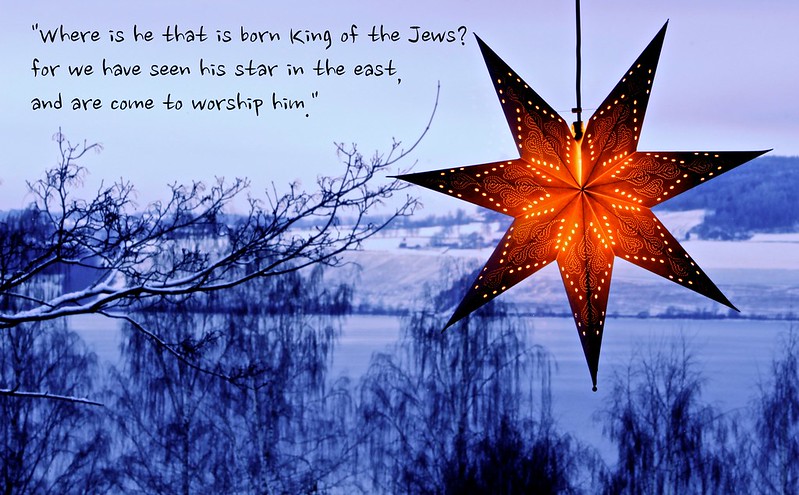
Revised Common Lectionary Reflection, Epiphany of the Lord, Year B
January 6, 2020
Lessons: Isaiah 60:1-6; Psalm 72:1-7, 10-14; Ephesians 3:1-12; Matthew 2:1-12
Theme: God’s faithful and generous people recognize the Christ as he is made visible in this world and are not afraid of a little holy disobedience.
Key Scripture: And having been warned in a dream not to return to Herod, they [wise men from the East] left for their own country by another road. – Matthew 2:12
I like Matthew’s account of the Magi’s visit. I like it when reenacted by restless youth in scratchy bathrobes and foil-covered crowns. I like it when I am able to sing “We Three Kings” with gusto, and I am intrigued by the mystique of the Magi. They were foreigners who practiced a different faith and who looked to the signs and wonders in the stars for guidance. In identifying the Christmas star, a phenomenon that occurred again this year, and matching it with their signs that a new king was born, they up and headed out to worship the new king and bring him valuable gifts. We’re not talking a silver rattle or china dinner set either; the wise folk brought precious oil, resin, and gold.

Following what must have been diplomatic protocol for the day, the Magi go first to King Herod, the insecure and foolish tetrarch who ruled Israel under Roman occupation—a mere puppet king. Herod’s response is fear. He calls his priests and scribes and finds out that yes, there is a prophecy for the Messiah to be born in Bethlehem of Judea. No one seems to know how to react to this news, but Herod attempts to enlist the Magi’s help in finding this new threat to his reign. Somehow proper protocol is observed and no one appears to lose their temper or head. The Magi head to Bethlehem to find the child and honor him. They leave valuable gifts of frankincense, myrrh, and gold. And, they practice a holy bit of disobedience by heeding a dream warning to avoid Herod, choosing a different route home.
I like their holy disobedience. It’s a reminder to me to remain focused on my mission as a faithful disciple, avoiding being sidetracked by religious or institutional intrigue or being swayed by the power of false leaders and cultural expectations. The Magi are careful in their choices and stay focused on their mission. They have traveled from far away to honor this new king that they have discerned in their study of stars and planets. They will not be triangulated into Herod’s grip of fear-filled and vitriolic leadership.
The Magi offer good lessons to those of us called to follow Jesus today. First, they were paying attention to creation around them. The chief priests and scribes evidently hadn’t done their homework concerning the prophecy. Herod was just flat out threatened and afraid; the thought that his fragile hold on an illusion of power might slip away with this new king would drive him to genocide, killing all male infants two or younger in Bethlehem.
We need to pay attention today to the world around us. Where do we see and experience Jesus? How do we understand our role as disciples? How do we faithfully and without fear or power plays study scripture and discern what God is speaking to us today? Are we looking to those outside our religious institutions and systems for critique and suggestion?

Remaining focused on what’s important—that which matters to God—is what we are charged with doing. It’s what the Magi did. They also brought the very best of themselves and their resources with them to honor Jesus. Do we bring the very best of ourselves, our first fruits, to the work of the Body of Christ?
Some Christians might say they don’t want to be like the Magi, foreign outsiders who practiced a different religion. Funny thing is that throughout scripture God gives us instructions to honor foreigners and make a place for them. Jesus also teaches us to love God and neighbor. Perhaps folks feeling some hesitation will take comfort in remembering God’s preferential treatment for outsiders and those on the margins. If we’re feeling cozy in our Christianity, it’s probably time to take a deep look at our faith practices.
Finally, like the Magi we may need to make some difficult decisions that amount to holy disobedience. If we encounter someone like Herod trying to draw us into an unholy plan, then like the Magi we’d better find another route home. Just don’t go there. If you experience faith that’s leaned too far into nationalism, righteous anger, or exclusion, maybe you’d do well to reread the story of the Magi. If it takes a few scratchy bathrobes, foil crowns, and squiggly youth to recount this story, it’s worth it. Just make sure your youth understand the deep importance of this story, too. Blessings on your faithful preaching and teaching; may we all come to encounter the Christ in new and fresh ways.
In
Worship
If you choose to use this Sunday to celebrate the Epiphany,
you may wish to incorporate the reading from John’s gospel for the Second
Sunday after Christmas Day, (John 1:91-9), 10-18. You might also want to use
images from this season’s Christmas Star appearance. Be sure to include the
hymn “We Three Kings” if you can.
What does it look like to pay attention today to signs and wonders in the world? What about those who are watching our planet for signs of stress and climate change? How about those who raise a prophetic voice in solidarity with the poor and marginalized? What is a proper Christian response? Invite worshipers to share where they have seen Jesus in the world. If you are worshiping via Facebook Live or Zoom encourage worshipers to use the comments section.
With
Youth
Today invite youth to consider when their Christian faith might put them at
odds with civil laws, social norms, and prevailing views. What do they see as
controversial for Christians in their world? How might it be helpful for us to
be in relationship with people whose views differ from ours or who practice
their faith differently? What can we learn in the process? What might we need
to watch for?
Check out this link about hosting civil conversations from the National Center for Family Philanthropy! It may be helpful as you embark on discussions of difficult and potentially divisive subjects.
With
Children
This week’s focus verse is Matthew 2:11: – On entering
the house, they saw the child with Mary his mother; and they knelt down and
paid him homage. Then, opening their treasure chests, they offered him gifts of
gold, frankincense, and myrrh.
Knock, knock. Who’s there? The Magi. The Magi who? The Magi bringing gifts to Jesus, that’s who. It might feel strange to open your door and see an entourage that had come all the way from a distant land to visit your family and bring gifts to its youngest member. These weren’t what we would consider normal baby gifts either. If we were taking a baby gift to someone we might buy… (entertain all answers). I’m not so sure I’d know what to do with Frankincense and Myrrh. I could figure out how to use gold, I think.
If you have essential oils of Frankincense and Myrrh available, let the children smell them. These were precious oils and resins and are very valuable. Of course, the gold was valuable, too. These were gifts that Jesus’ family could have used or traded as they fled to Egypt. That made them very useful gifts.
What gifts do you have to bring to Jesus? Christina Rossetti wrote a poem that was set to music. You can find “In the Bleak Midwinter” in the Christmas section of your hymnal (Evangelical Lutheran Worship #294). The singer is trying to decide what to give the infant Jesus. It ends with these words: “yet what I can I give him—give my heart.
When we give Jesus our heart, we give him the very best part of ourselves. And when we give our heart, the rest of us will follow, and we will give all that we are and have to our Lord.
Finish with a simple echo prayer and blessing.
Dear God (Dear God),
Thank you (Thank you) for loving us (for loving us). Thank you for the witness of the Magi (Thank you for the witness of the Magi). Help us to give Jesus our very best (Help us to give Jesus our very best), and to give him our heart (and to give him our heart).
Keep us from fear (Keep us from fear). Keep us hopeful (Keep us hopeful). Make us helpful (Make us helpful). Give us peace (Give us peace). Amen (Amen).
Weekly
Stewardship Bulletin Insert
The Magi brought valuable gifts to the infant Messiah, gifts
of gold, frankincense, and myrrh. They brought the best they had to give, and
as stewards so do we. Thank you for giving generously so that the many good
ministries and mission of our congregation can continue to show God’s love to
our community and beyond.
Stewardship at Home
How about making a Three Kings Cake at home this week to celebrate the Feast of the Epiphany (January 6)? Also known as Dia de los Reyes (Three Kings Day) in some Spanish-speaking countries, this yeast bread cake usually features a small plastic baby that is placed inside before the icing is spread. Whoever gets the piece with the baby has to bake the cake the next year or host a party on Candlemas (February 2). Here’s a recipe from King Arthur Flour and an easy recipe that uses refrigerated crescent rolls.
2020 Reflection: https://www.stewardshipoflife.org/2020/01/light-jesus-action/
Note: Reprint rights granted to congregations and other church organizations for local, nonprofit use. Just include this note: “Copyright (c) 2021, Rev. Sharron Blezard. Used by Permission.” Other uses, please inquire: thewritelife@hotmail.com.



Leave a Reply